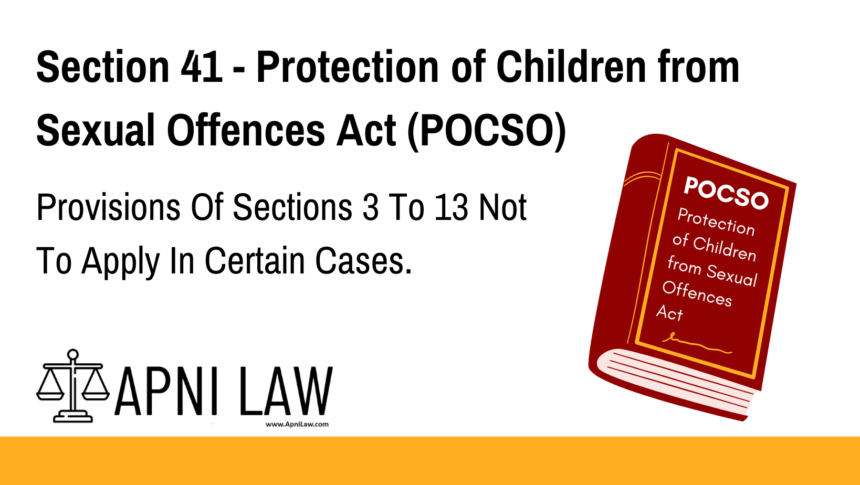Code: Section 41 POCSO
The provisions of sections 3 to 13 (both inclusive) shall not apply in case of medical examination or medical treatment of a child when such medical examination or medical treatment is undertaken with the consent of his parents or guardian.
Explanation of Section 41 POCSO
Section 41 of the Protection of Children from Sexual Offences Act (POCSO) makes an important exception for medical procedures. It states that the rules in Sections 3 to 13 do not apply when a child undergoes a medical examination or receives medical treatment, as long as the parents or guardian give their consent.
Why This Matters:
- Sections 3 to 13 of POCSO deal with the definition of sexual offences, the penalties, and legal procedures for investigating and prosecuting such cases.
- However, this section makes sure that children can receive medical care without having to follow the lengthy legal processes of these sections.
In other words, this provision allows children to get the medical help they need without delay, as long as their family approves. It ensures that children receive necessary care while still protecting their legal rights.
Illustration
Example 1: Medical Examination with Parental Consent
A child who has been sexually abused needs a medical examination. If the parents or guardians consent, the medical exam can be conducted without needing to follow the strict requirements of Sections 3 to 13 of the POCSO Act.
Example 2: Medical Treatment
If the child needs urgent medical treatment, the treatment can proceed immediately if the guardian agrees. This ensures the child’s health is prioritized over legal procedures.
Common Questions and Answers on Section 41 POCSO
1. Does Section 41 exempt all medical examinations from POCSO rules?
- Answer: No, it only applies to medical exams and treatment, provided the child’s parent or guardian gives consent.
2. Can a child’s medical care happen without parental consent under this section?
- Answer: No, the parent or guardian’s consent is required to proceed with the medical examination or treatment.
3. Does this provision impact the investigation of the sexual offence?
- Answer: No, the investigation continues separately. This provision only applies to medical procedures.
4. What happens if the child cannot provide consent?
- Answer: In such cases, the parent or guardian must give consent for the medical procedures.
Conclusion
Section 41 of the POCSO Act ensures that children can receive essential medical care without delay. When parents or guardians consent, medical procedures can take place immediately, without needing to follow the legal formalities required for sexual offence investigations. This provision focuses on the child’s well-being, making sure they get the medical attention they need quickly.
For more legal insights into child protection and the POCSO Act, visit ApniLaw today!








